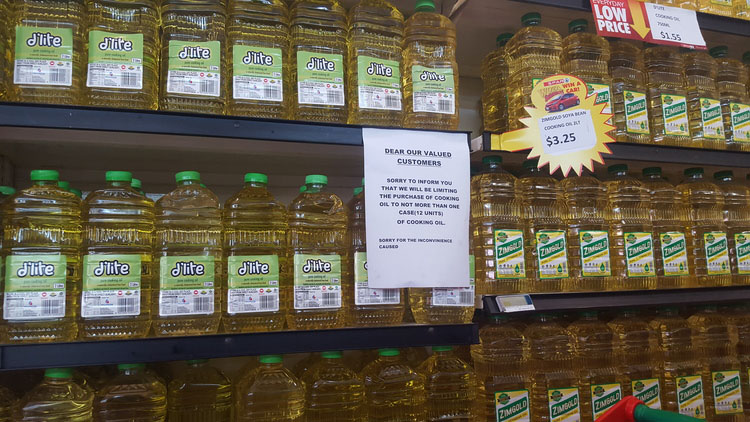
The Sunday Mail

RESERVE Bank of Zimbabwe (RBZ) Governor Dr John Mangudya has swiftly moved in to avail foreign currency to cooking oil producers so as to avert a potentially crippling shortage of the product.
Cooking oil production had dramatically declined in the last month, prompting top retailers to start rationing cooking oil, restricting consumers to purchasing not more than 24 litres of cooking oil (a box of 2 litre bottles) in one transaction.
The country is battling a foreign currency shortage, which is now adversely impacting on several sectors of the economy, particularly producers that rely on imported raw materials and fuel dealers.
The foreign payments backlog is currently pegged at US$570 million, up from US$186 million in May.
Dr Mangudya expects the foreign payments situation to improve by mid-month when the country is expected to start benefiting from a US$600 million nostro stabilisation facility availed by the African Export Import Bank (Afreximbank).
Last week, Oil Expressers Association of Zimbabwe president Mr Busisa Moyo told The Sunday Mail Business that foreign currency payments bottlenecks for raw materials are adversely impacting on their operations.
Mr Moyo said he expects the situation to improve in the near future following the intervention by the RBZ which has provided some foreign currency to oil producers.
The cooking oil sector requires US$20 million a month but between January and July this year, it has received a measly US$61 million for foreign payments from the RBZ.
This has left a deficit of US$79 million which is now reflecting through a decline in production and, consequently, rationing of the product.
“We are currently facing some challenges in terms of sourcing some raw materials. It is an issue based on allocation of foreign currency but there has been an improvement as of this (last) week so we are working to get the situation back to normal.
“Over the last three weeks, we have had challenges in terms of getting what we need on a monthly basis but the situation improved this (last) week.
“We just trust that it will continue improving so that we keep supplies at a normal level. The sector needs US$5 million a week for us to operate at a normal level but if you look at statistics of what we have got, it’s US$61 million up to July,” said Mr Moyo.
He declined to give the exact amount that oil expressers have been getting per week from RBZ, saying the information was confidential.
Despite the foreign payments challenges, Mr Moyo said consumers should not panic as there would be no cooking oil shortages in the country.
“No, no (there is no need to panic). I think the governor (of the RBZ) is working on reconciling the (foreign currency) position. Foreign currency is short and they are allocating from a small pot.
“There are constraints but they (RBZ) are trying as best as they can and remember we have not had shortages in the last seven months and we should be able to continue,” said Mr Moyo.
It could not be established how much the RBZ is considering to allocate to the cooking oil producers as Dr Mangudya was not answering his mobile phone and had not responded to questions sent via social media platform, WhatsApp, by the time of going to print.
Egg shortages persist
The foreign currency shortages, together with the H5N8 bird flu outbreak, have also conspired to create a shortage of eggs on the market in the last two months.
Bird flu first broke out on June 2, but returned to haunt the sector late in July, resulting in widespread shortages of eggs on the market.
Irvine’s chief executive officer Mr David Irvine confirmed the shortage of eggs last week but declined to take further questions, saying the Department of Veterinary Services was responsible for all communications at the moment.
“We are short of eggs at the moment but I don’t really want to make a comment because I am not allowed to comment. The comments have got to come from the Director of Veterinary Services, Dr Josphat Nyika.
“Everything that we do would have to be approved by the Veterinary Department at this stage. So I can’t really tell you anything.”
Dr Nyika’s mobile was not reachable amid indications that he was outside the country.
Last week, Zimbabwe Poultry Association (ZPA) chairperson Mr Solomon Zawe told The Sunday Mail Business that: “There are no layers, they were killed by diseases (Avian flu). The disease has caused the shortage of eggs.
“I don’t know how many birds were killed due to the disease.”
It is understood that over one million laying birds were killed as part of efforts to contain bird flu.
Mr Zawe said the sector is now planning to import hatching eggs from Europe.
They have since asked the Ministry of Finance to waive the 40 percent duty that was in place to reduce the cost of importing the eggs from Europe.
“The duty was removed last month. We are not sure when the eggs will arrive in the country. “Once we get our foreign currency allocation, we will import the eggs but otherwise the job has been done,” said Mr Zawe.
Currently, prices for eggs have skyrocketed as entrepreneurs seek to take advantage of the shortages.
Ordinarily, a crate of eggs costs about US$5 but because of the shortages, the price has risen to US$7,50.
And Mr Zawe said “that is proper business”.
“Those that have the product should maximise. When there is demand in an environment of shortages, you maximise and when supplies return to normal, you lower your price.”






